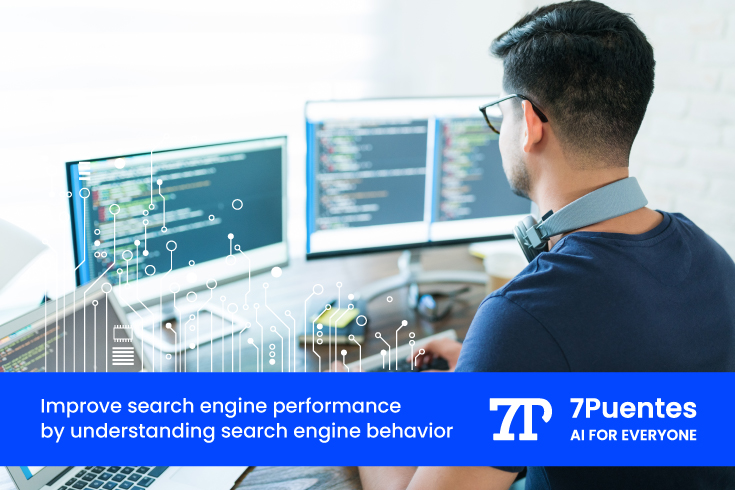In many cases, a retailer invests a significant amount of money in the development of its product platforms. But are you properly evaluating your online search engine performance to generate optimal results? Are you looking at the metrics that are relevant to your business? In this article, we will show you how the 7Puentes solution can help you to increase your profits by knowing and evaluating the operation of your search engine in depth, and generating fundamental recommendations to optimize it.
Web search engines are one of the main gateways for your potential customers to find the products of their choice in your store, or simply to research a little more about different alternatives before making a purchase decision.
The development and business intelligence of these platforms have become essential pillars in a scenario where consumers are increasingly demanding: they are looking for new ways to buy, to satisfy their demand for products quickly, and for their experience to be highly personalized and friendly. Unlike other business sectors, retail is increasingly focused on omnichannel, customer journey and contactless, all attributes already inherited from e-commerce. But they are enhanced by artificial intelligence and machine learning solutions.
The key question is whether your executive team understands the true value of your product finder and has evaluated solutions that allow you to sell more, faster, and more effectively with AI. In this post, we’ll explore some of the issues and recommendations surrounding this question.
Search engine value metrics
One of the first aspects of our business that we need to understand in depth is their search engine behavior and the users who use the platform.
In this sense, each search engine has its own very specific and unique behavior. Let’s say I’m looking for a heater for this winter and in my usual appliance store I find this first result of an “intelligent refrigerator” that costs more than 800 dollars, from there I go to the main sites in e-commerce and I find it at 600, I make the comparison and I don’t buy it in the store because it’s more expensive. So I put it on hold and didn’t put it in my shopping cart.
What do I consider when deciding whether this search engine was good or bad? Do I consider that the user searched for the price, or do I consider that they did not buy the product?
It is important to determine if the success of the search is determined by whether I click on the product details or simply make the purchase. The question is more subtle because I also have to consider the positions of the results that the search engine returned to me: What if this retailer, instead of showing me this $800 refrigerator, showed me one for $500? Surely, if my decision criterion was price, I would have leaned toward 500, since I couldn’t get it for less than 550 in e-commerce. In short, the times our users click on this product because the cheapest determines their behavior and always buys it, so as an executive you should decide to upload the product to the first result. Because it is the cheapest.
This is one of the measures that we develop at 7Puentes and now we tell you how we are experts in mastering these problems and managing their solution.
- MRR: The metric we evaluate is called «Mean Reciprocal Rank» (MRR). It is one of the key metrics that help evaluate the quality of information retrieval and recommendation systems. Simply put, it helps to understand the average position of the first relevant item across all user lists. In this way, knowing in detail both how our mass consumption search engine works and the fact of how our search engine users behave, we can improve the ordering of our products on the platform, implementing solutions to effectively ensure that our users first click more on the product we want to sell (or simply show more) and then buy more.
- CTR: Another important metric is related to this conversion. For example, for every 10 searches for household products or electronics, I got 6 clicks. This is the CTR (click-through rate). It is a key indicator of the effectiveness of an ad or content in capturing the attention and interest of the target audience. Assuming that if I clicked here on this product, I intended to buy it, often the click is a relevant indicator of that purchase intent, regardless of where the consumer is in our conversion funnel. But I can take that into account in my next campaign to launch the next generation of TVs to watch the Olympics or the World Cup.
- Zero search: Finally, an additional metric we need to consider is «0 searches». We explain it with an example: if many searches related to Marilyn Monroe and Walt Disney start appearing in the retail store, but the search engine returns “null results”. This could be a problem if the searches are massive (you should take into account the products that are most related to the famous people being searched for, because if users’ searches for these people were sporadic, it would not be so serious). Therefore, our search engine needs to take into account those searches that are becoming more popular and evaluate whether there are no cases of 0 results within those searches, an issue that we need to address urgently. This is something that movie and series streaming platforms solve very well, for example when searching for a movie that is not available on the platform, but still gives similar results (by genre or theme of the movie or series).
In short, it would be very unfair and inaccurate to say that a search engine is wrong because I did not buy the product. There are other very complex and sophisticated factors that I have to evaluate: MRR, CTR, Zero search, searches with many relevant clicks and orders where I added the product to the cart (even if I left the purchase pending) are all examples that show the need to better understand and optimize how our product search engine works. And for this, it is essential to have the development of algorithms and models based on AI and machine learning by a team of experts with deep knowledge of the business.
7Puentes: Partner of AI-powered product search in the retail sector
At 7Puentes, we have the right solution for your problem. If you do not know how your search engine works in depth and what the real behavior of your users is, it is time to contact us to evaluate the best solution for your business problem and discover your value metrics.
We invite you to unleash the power of AI and revolutionize the search functionality of your website or business platform.
How do we implement the optimization solution on your search engine?
- Data collection: We collect and organize essential data to make accurate predictions.
- Model Training and Calibration: We train the advanced algorithms and tune the model for greater accuracy.
- Deployment and Integration: We seamlessly integrate the forecasting solution into your business operations.
- Monitoring and Optimization: We continuously monitor and optimize the AI model to improve accuracy.
Are you ready to give your users a better and more efficient search experience? Contact our AI and Smart Product Search specialists for a free consultation.


